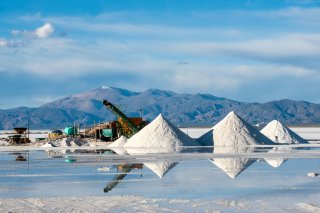Whose Lithium? Latin America's Struggle Between Investment and Sovereignty
For Latin America, resource nationalism provides a broad policy framework; its application is where the challenge lies.
Second, Latin America’s place as a source of lithium will keep it in the middle of the new Cold War-like competition between China and the West, which thus far is being played in economic terms. The willingness of Latin American countries to steer clear of picking sides in any great power rivalry is understandable, but may prove to become increasingly difficult. Bolivia has already clearly indicated where it sits on this matter by moving ahead with China and Russia.
Third, resource nationalism is not going away any time in the future. It will remain a factor as governments seek to maximize their leverage in striking new deals. While there has been talk from Bolivia and Mexico about forming a lithium cartel, the idea has not caught on. The Organization of Petroleum Exporting Countries’ success is looked upon as the model, but it is the exception to the rule. Other cartel ideas from bananas to bauxite have proven to be dismal failures. Moreover, how much leeway would a Latin American lithium cartel have when countries like Australia are not included and the ranks of new producers are rising, especially in Africa? And then there is the question of new technology that could sideline lithium.
Fourth, the region must respond to the growing concern of Indigenous peoples and environmental leaders as to the impact of lithium projects on the environment. Over half of today’s production is in areas of high water stress. Any foreign companies looking to develop lithium projects will have to navigate through these factors.
Looking ahead, greater resource nationalism is most likely to be asserted throughout Latin America, though in different ways and at different levels. For Latin America, resource nationalism provides a broad policy framework; its application is where the challenge lies. While it is fully justifiable for Latin American governments to extract the best deal they can for their citizens, too stringent an application can kill deals and send investors and mining companies to find more open markets elsewhere. It can be stated that lithium is of national strategic importance; it does little good if it remains in the ground. The challenge is to find a happy medium, which historically has always been difficult.
Dr. Scott B. MacDonald is the Chief Economist for Smith’s Research & Gradings, a Fellow with the Caribbean Policy Consortium, and a Research Fellow with Global Americans. Prior to those positions, he worked for the Office of the Comptroller of the Currency, Credit Suisse, Donaldson, Lufkin and Jenrette, KWR International, and Mitsubishi Corporation. His most recent book is The New Cold War, China and the Caribbean (Palgrave Macmillan 2022).
Alejandro Trenchi is a Research Assistant at Global Americans for the organization’s High-Level Working Group on Climate Change in the Caribbean.
Image: Shutterstock.

